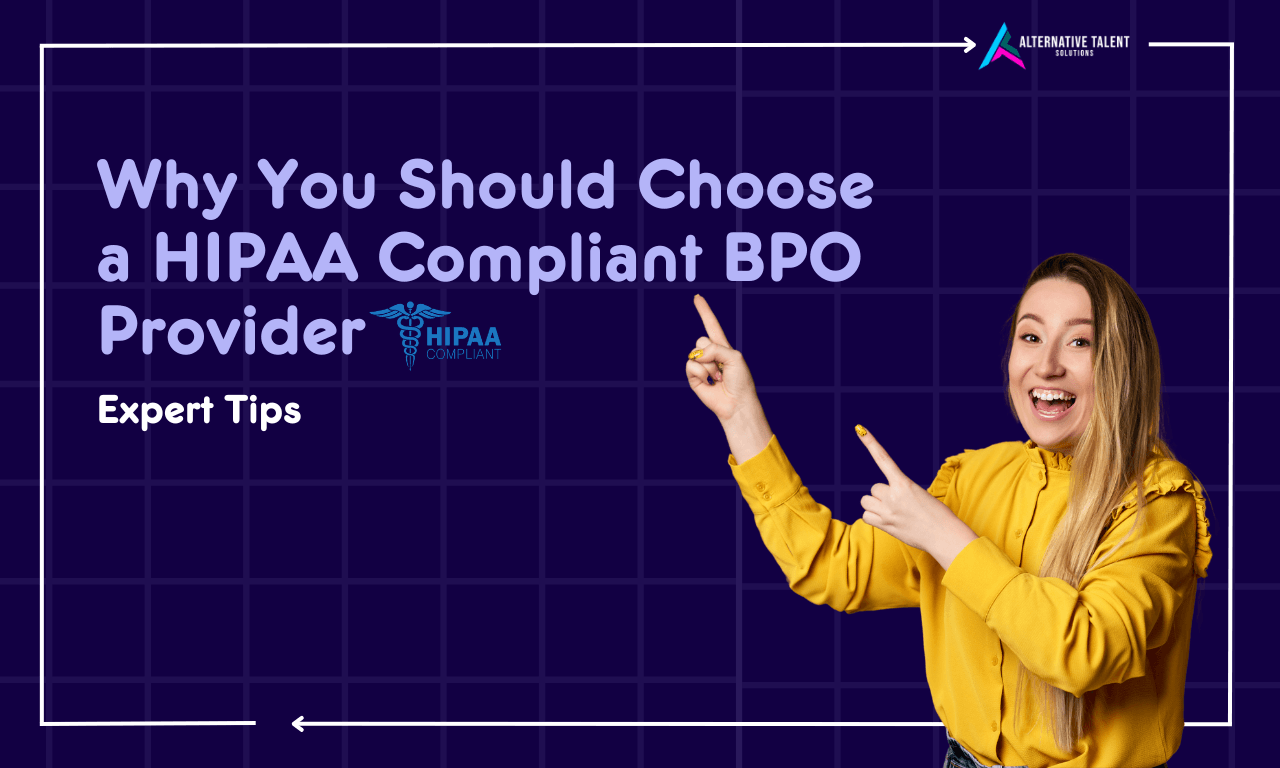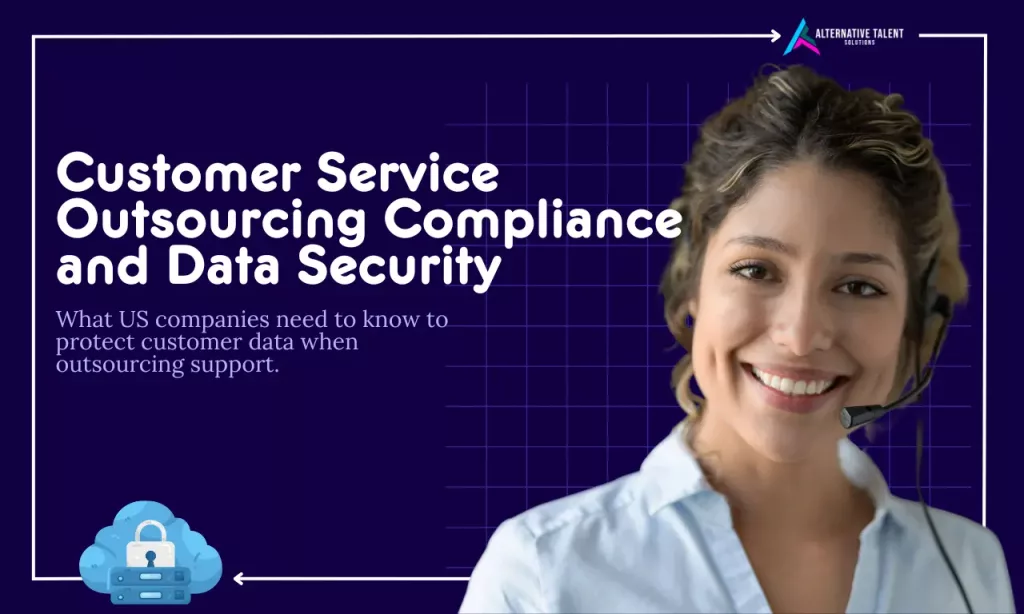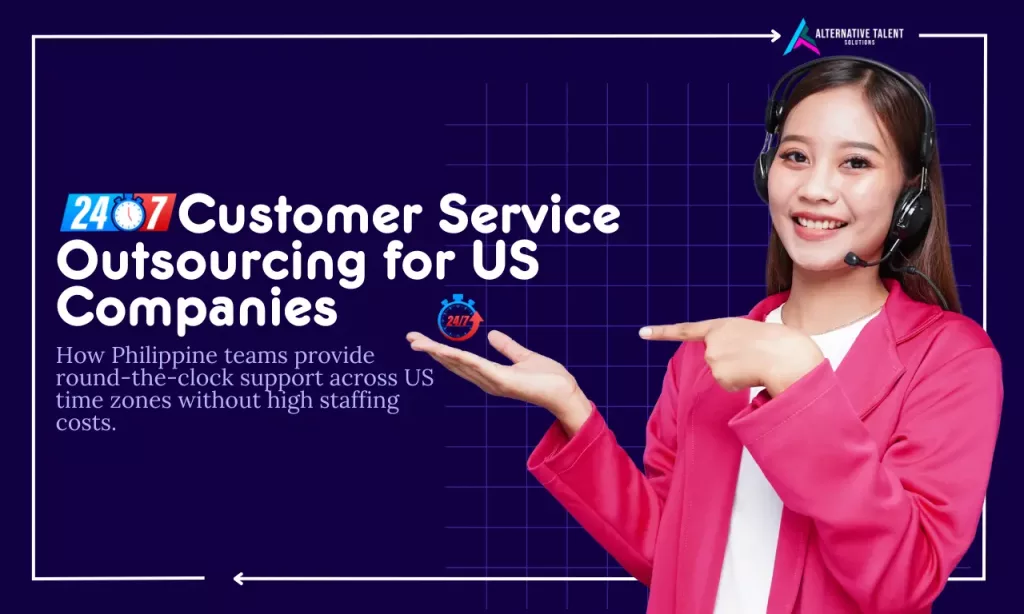Healthcare teams handle sensitive patient information every day. Tasks like billing, claims processing, updating records, and supporting patients all involve private data. When these tasks pile up, accuracy drops and delays increase — and one mistake involving patient information can lead to serious compliance issues.
This is why many healthcare providers use outsourced admin support. But outsourcing only works when the partner follows strict HIPAA compliance rules.
This guide explains what HIPAA compliance means, what PHI is, which tasks you can outsource safely, and how ATS protects patient data through secure systems and trained staff.
- HIPAA compliance protects patient information and is required for any task involving PHI
- PHI includes any data that can identify a patient, such as medical records, billing details, or contact information.
- Outsourcing is allowed under HIPAA as long as a Business Associate Agreement (BAA) is in place.
- ATS follows strict safeguards—HIPAA training, secure workstations, encryption, audit logs, and role-based access.
- Healthcare providers outsource to reduce admin backlogs, increase accuracy, and improve patient experience.
- Common outsourced roles include billing, claims processing, transcription, records management, and patient admin support.
- HIPAA-compliant outsourcing helps healthcare organizations improve efficiency without risking privacy violations.
What HIPAA Compliance Means
HIPAA — the Health Insurance Portability and Accountability Act — sets rules for how healthcare organizations must protect patient information.
According to the U.S. Department of Health and Human Services (HHS), HIPAA compliance requires:
1. The Privacy Rule
Defines what counts as Protected Health Information (PHI) and how it can be used or disclosed.
2. The Security Rule
Requires safeguards that protect electronic PHI (ePHI). These include:
Administrative safeguards
- Training
- Access policies
- Procedures for proper PHI handling
Physical safeguards
- Secure workspaces
- Controlled access to devices
- Restricted physical environments
Technical safeguards
- Encryption
- Secure logins
- Role-based access
- Audit logs
3. Business Associate Agreements (BAAs)
HIPAA requires healthcare providers to sign BAAs with any vendor that handles PHI.
The BAA confirms:
- What PHI the partner can access
- How it must be protected
- The safeguards required
- Responsibilities of each party
HIPAA does allow outsourcing, but only if these rules are strictly followed.
What Is PHI? (Protected Health Information)
Protected Health Information (PHI) is any identifiable information about a patient’s health, treatment, or payments.
HIPAA defines PHI as any data that can identify a patient, including:
- Name
- Address
- Email or phone number
- Medical record number
- Insurance details
- Treatment notes
- Lab results
- Billing information
- Dates related to care (admission, discharge, etc.)
- Photos, recordings, or documents tied to a patient
If information can be linked to a specific person, it is PHI and must be protected through HIPAA safeguards.
Adding this definition strengthens clarity and meets Google’s expectations for accuracy.
Why Healthcare Teams Outsource Admin Work
Healthcare operations grow more complex each year. Admin tasks increase faster than clinical capacity, and teams get overwhelmed.
Outsourcing gives you trained specialists who handle the heavy lifting without compromising patient privacy.
Why providers outsource:
- Billing backlogs slow down revenue
- Claim errors delay reimbursement
- Documentation piles up
- Staff burnout affects quality
- Compliance tasks become overwhelming
- Admin load limits patient-facing work
When done with a compliant partner, outsourcing reduces errors and improves workflow reliability.
Tasks You Can Outsource While Staying HIPAA Compliant
Many healthcare tasks involve data but not clinical decisions. These are ideal for outsourcing because they are process-driven and benefit from accuracy and speed.
1. Medical Billing
- Coding support
- Charge entry
- Payment posting
- Denial follow-ups
2. Claims Processing
- Eligibility verification
- Prior authorizations
- Claims submission
- Payer communication
3. Medical Records Admin
- Chart updates
- Indexing digital files
- Document classification
4. Patient Admin Support
- Appointment reminders
- Intake assistance
- Referral coordination
- Non-clinical patient communication
5. Medical Transcription
- Clinical documentation
- Consultation notes
- Procedure summaries
Each of these tasks can be outsourced safely as long as the partner follows HIPAA safeguards. To see the full range of support available, visit our Healthcare Solutions page.
Why HIPAA Compliance Matters in Outsourcing
Healthcare information is sensitive. Even a small mistake — like sending a file to the wrong person or mishandling a document — can lead to:
- Delayed care
- Patient concerns
- Compliance violations
- Reportable incidents
A HIPAA-compliant partner reduces risks through consistent, secure workflows and trained specialists.
Compliance protects your organization and supports better patient care. If you want a simple overview of how back-office support works in healthcare, you can also read our Beginner’s Guide to Back-Office Outsourcing.
How ATS Protects PHI and Stays HIPAA Compliant
ATS follows strict safeguards aligned with HHS requirements. Our goal is simple: keep patient information secure at every stage of work.
1. Mandatory HIPAA Training
- All staff complete HIPAA training before handling any records.
- Regular refresher sessions strengthen privacy knowledge.
- Training covers Privacy Rule, Security Rule, and PHI handling.
2. Signed Business Associate Agreements (BAAs)
- ATS signs BAAs for every healthcare engagement.
- Responsibilities and protections are clear and documented.
3. Controlled Access to PHI
- Only trained staff can access PHI.
- Role-based permissions limit exposure.
- Multi-step authentication protects logins.
4. Secure Systems and Tools
- Encrypted communication and storage
- Protected workstations
- No personal devices in secure areas
- Controlled systems with limited access rights
5. Detailed Audit Logs
- Every access to PHI is logged.
- Logs help detect unusual activity quickly.
- Regular reviews maintain compliance.
6. Secured Philippine Delivery Centers
- Private, monitored workspaces
- No USBs, phones, or outside devices
- Controlled entry points
- Dedicated healthcare support areas
These protections help healthcare providers outsource safely without compromising HIPAA standards.
How to Know If HIPAA-Compliant Outsourcing Fits Your Facility
Ask your team a few key questions:
- Are billing or claims delays affecting revenue?
- Are admin tasks overwhelming your clinical staff?
- Is PHI accuracy difficult to maintain internally?
- Do you need support that scales fast?
- Are documentation backlogs hurting workflows?
If you said yes to two or more, outsourcing may help stabilize your operations.
Common Mistakes to Avoid
To maintain HIPAA compliance, avoid these mistakes:
- Outsourcing without a signed BAA
- Sharing PHI through unsecured tools
- Allowing untrained staff to access patient data
- Not reviewing access logs
- Outsourcing tasks without clear SOPs
A reliable partner prevents these issues with strong training and built-in safeguards.
If you want reliable admin support without risking compliance, ATS provides trained teams who follow strict HIPAA rules.
Can healthcare providers outsource under HIPAA?
Yes. HIPAA allows outsourcing as long as the partner signs a BAA and follows all required safeguards.
What is a BAA?
A Business Associate Agreement outlines how PHI will be protected and the safeguards the vendor must follow.
What tasks are safe to outsource?
Billing, claims processing, transcription, patient support admin, and medical records tasks can be outsourced safely.
How does ATS protect PHI?
Through training, restricted access, secure systems, private offices, encryption, and audit logs.
Is offshore outsourcing allowed under HIPAA?
Yes. HIPAA does not limit PHI to U.S. borders. Offshore outsourcing is allowed if the partner follows HIPAA safeguards and signs a BAA.













